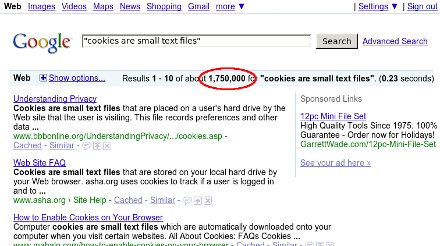Shallow Thoughts : : Dec
Akkana's Musings on Open Source Computing and Technology, Science, and Nature.
Tue, 29 Dec 2009

My favorite headline from today's paper:
Waves breach sand berm
What sort of sand berm, you wonder, that merits a headline in the
paper? No doubt a critical one, protecting the
town from the ravages of the sea? Well, maybe not:
"The situation is not unusual," he added. "It happens every year."
I guess it was a slow news day.

The full-page ad on the back of the main section was good, too.
Mmmmm ... melamine candy!
Tags: humor, headlines, slownewsday
[
12:42 Dec 29, 2009
More humor |
permalink to this entry |
]
Wed, 23 Dec 2009
Third in my GIMP-for-the-holidays series on Linux Planet:
Fixing
holiday photos with GIMP
Happy holidays, everybody ... and happy holiday photos!
Tags: writing, gimp, printing
[
19:44 Dec 23, 2009
More gimp |
permalink to this entry |
]
Thu, 17 Dec 2009
![[Sample greeting card]](http://www.linuxplanet.com/graphics/screenshots/Fig1-foldedcard_1.jpg)
A followup to last week's article on making custom greeting cards
with GIMP,
today's Linux Planet tutorial discusses how to get those cards
printed -- even if you don't own a decent color printer.
On Linux Planet:
Printing
Holiday Cards Even if you Don't Have a Printer.
Tags: writing, gimp, printing
[
19:50 Dec 17, 2009
More gimp |
permalink to this entry |
]
Tue, 15 Dec 2009
I've been using fetchmail for a couple of years to get mail from the
mail server to my local machine. But it had one disadvantage: it meant
that I had to have postfix (or a similar large and complex MTA)
configured and running on every machine I use, even the lightweight
laptop.
I run procmail to filter my mail into folders -- Linuxchix mail into
one folder, GIMP mailing lists into another, and so forth -- and it
seemed like it ought to be possible for fetchmail to call procmail
directly, without going through postfix.
I found several suggestions on the web -- for instance,
fetchmail-procmail-sendmail
-- but they didn't work for me. fetchmail downloaded each message, passed
it to procmail, and procmail appended it to the relevant mailbox
without the appropriate "From " header that mail programs
need to tell when each new message starts.
Finally, on a tip from bma on #linuxchix and after a little
experimentation, I added this line to ~/.fetchmailrc:
mda /usr/bin/procmail -f %F -m /home/username/.procmailrc
Works great! And it's a lot faster than going through postfix.
Tags: linux, email, fetchmail, procmail
[
15:07 Dec 15, 2009
More tech/email |
permalink to this entry |
]
Thu, 10 Dec 2009
![[Sample greeting card]](http://www.linuxplanet.com/graphics/screenshots/Fig1-foldedcard_1.jpg)
Today's Linux Planet tutorial is a simple walkthrough showing you
how to make custom greeting cards in GIMP:
Make
Your Own Holiday Cards with GIMP.
Have fun!
Part 2, next week, will offer tips on printing, whether on a home
inkjet or using other services.
Tags: writing, gimp
[
15:19 Dec 10, 2009
More gimp |
permalink to this entry |
]
Sat, 05 Dec 2009
I had been dithering about whether to buy another inkjet to replace
the Epson C86 that died earlier this year. The Epson wasn't all that
old, but its nozzles wouldn't unclog, and reviews of Epson's latest
printers aren't at all complimentary.
HP looked like the best solution, since they're the only printer
manufacturer that supports Linux directly.
I new wasn't going to buy Canon, because their closed protocols mean
that every Linux driver has to be reverse engineered, and I certainly
didn't want a Lexmark (see our last experience with Lexmark in
Cracking the
Lexmark Code).
But which HP? Their array of models is baffling, and no one seems to
know the difference between Deskjets, Officejets and Photosmarts,
or whether the inks fade, or whether the nozzles are built into the
ink cartridges (so a clogged nozzle doesn't mean a dead printer
like it does with Epson). And there's no way to get print samples.
So I dithered and stalled -- until Fry's put the HP Deskjet F4280 on
sale for $20.
The online reviews were fairly positive.
And for that price, and with Linux support, how bad could it be?
Answer: not bad at all.
It set up pretty easily in CUPS, though the CUPS test page didn't work
even after several tries. Fortunately, I don't need to print CUPS test pages.
Printing worked fine from GIMP, Firefox and OpenOffice.
The print quality is surprisingly good.
(Note: the F4280 is not the same printer as the Photosmart C4280,
which caused some confusion at Fry's when I tried to actually buy one).
Text and web page on regular paper come out crisp and sharp.
"High quality" on good photo paper looks like a photo as long as
you don't examine it too closely. It'll be fine for my holiday
greeting cards, business cards and most other tasks involving photos.
"Photo quality" takes a lot longer, and is indeed better
than "High" if you examine it with a loupe. Nobody's going to confuse
it with a real photo print under magnification,
but it'll look fine on the wall.
Here's the part that impressed me most: it can print all the way to
the edge of the paper with no hassle. I could never do that with the
C86: though the hardware was supposedly capable of it, the Gutenprint
drivers -- the reason I'd been sticking with Epson all those years --
never could handle it (and tended to print yellow smears on the
borders if you tried it). Good job, HP!
It's an "All in one" so it has a built-in scanner too (no fax).
SANE (on Ubuntu 9.10) doesn't see the scanner, and I haven't tried to
track that down since I already have a good scanner. I wouldn't have
bought an "all in one" except that dedicated printers are quite a bit
more expensive.
Update: it's the usual Ubuntu permissions problem,
combined with new udev rules. Root sees the scanner, users don't,
unless you add lines to two different udev rules files. In
/lib/udev/rules.d/40-libsane.rules, add:
ATTRS{idVendor}=="03f0", ATTRS{idProduct}=="2504", ENV{libsane_matched}="yes"
then create a new file /etc/udev/rules.d/45-libsane.rules and
put in it:
SYSFS{idVendor}=="03f0", SYSFS{idProduct}=="2504", MODE="664", GROUP="scanner"
More details are in
bug
121082.
And wow, the scanner output is really bad. I mean really, really bad.
I'm happy with the printer but I'll definitely keep my old Epson scanner.
Reviews complain that the F4280 is rather ink-hungry and the
ink cartridges are overpriced; but every inkjet printer review says
that (probably with good reason).
I don't print that much, so I'm not too worried.
And of course I know nothing about long term reliability
or how fade-resistant the prints will be.
Ask me in six months. But so far I'm quite pleased.
A nice printer with excellent Linux drivers.
Tags: printing, linux
[
20:47 Dec 05, 2009
More tech |
permalink to this entry |
]
Tue, 01 Dec 2009
"Cookies are small text files which websites place on a visitor's
computer."
I've seen this exact phrase hundreds of times, most recently on a site
that should know better,
The Register.

I'm dying to know who started this ridiculous non-explanation,
and why they decided to explain cookies using an implementation
detail from one browser -- at least, I'm guessing IE must implement cookies
using separate small files, or must have done so at one point. Firefox
stores them all in one file, previously a flat file and now an sqlite
database.
How many users who don't know what a cookie is do know what a
"text file" is? No, really, I'm serious. If you're a geek, go ask a few
non-geeks what a text file is and how it differs from other files.
Ask them what they'd use to view or edit a text file.
Hint: if they say "Microsoft Word" or "Open Office",
they don't know.
And what exactly makes a cookie file "text" anyway?
In Firefox, cookies.sqlite is most definitely not a "text file" --
it's full of unprintable characters.
But even if IE stores cookies using printable characters --
have you tried to read your cookies?
I just went and looked at mine, and most of them looked something like this:
Name: __utma
Value: 76673194.4936867407419370000.1243964826.1243871526.1243872726.2
I don't know about you, but I don't spend a lot of time reading text
that looks like that.
Why not skip the implementation details entirely, and just tell users
what cookies are? Users don't care if they're stored in one file or many,
or what character set is used. How about this?
Cookies are small pieces of data which your web browser stores at the
request of certain web sites.
I don't know who started this meme or why people keep copying it
without stopping to think.
But I smell a Fox Terrier. That was Stephen Jay Gould's example,
in his book Bully for Brontosaurus, of a
factoid invented by one writer and blindly copied by all who come later.
The fox terrier -- and no other breed -- was used universally for years to
describe the size of Eohippus. At least it was reasonably close;
Gould went on to describe many more examples where people copied the
wrong information, each successive textbook copying the last with
no one ever going back to the source to check the information.
It's usually a sign that the writer doesn't really understand what
they're writing. Surely copying the phrase everyone else uses must
be safe!
Tags: web, browsers, writing, skepticism, tech, firefox, mozilla
[
21:25 Dec 01, 2009
More tech/web |
permalink to this entry |
]
 My favorite headline from today's paper:
My favorite headline from today's paper:

![[Sample greeting card]](http://www.linuxplanet.com/graphics/screenshots/Fig1-foldedcard_1.jpg) A followup to last week's article on making custom greeting cards
with GIMP,
today's Linux Planet tutorial discusses how to get those cards
printed -- even if you don't own a decent color printer.
A followup to last week's article on making custom greeting cards
with GIMP,
today's Linux Planet tutorial discusses how to get those cards
printed -- even if you don't own a decent color printer.
